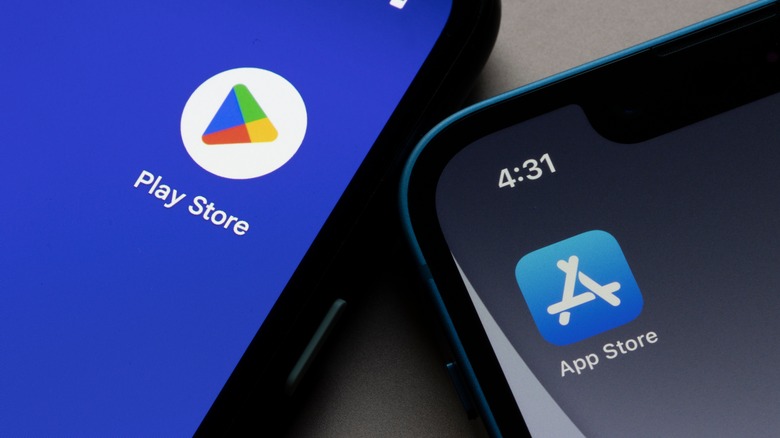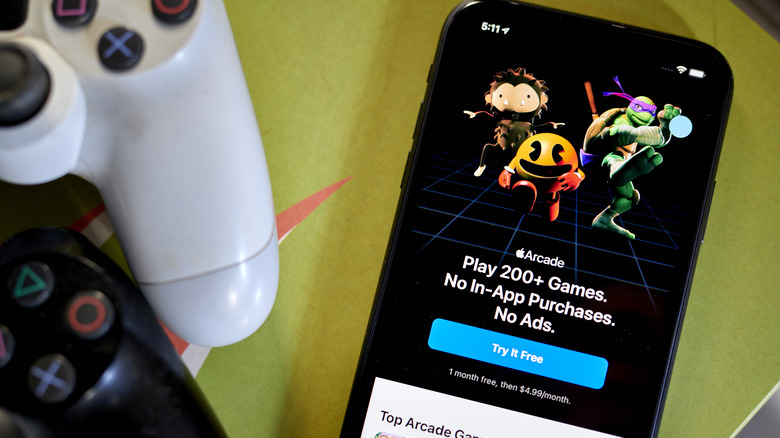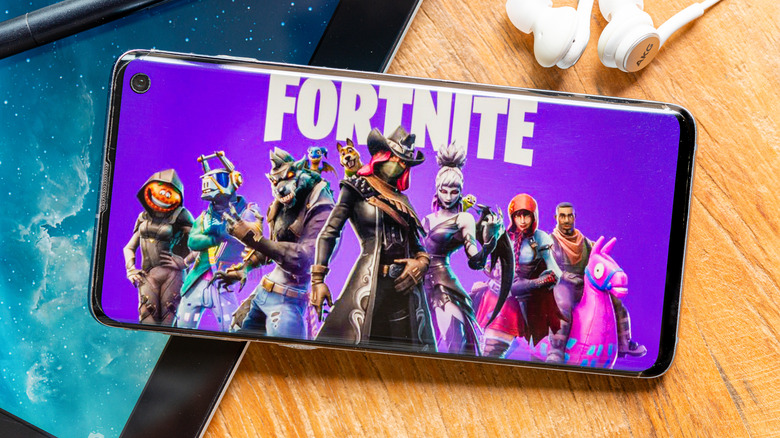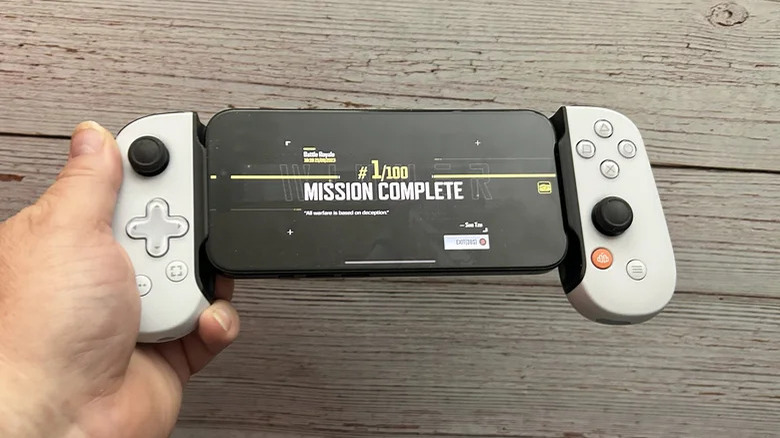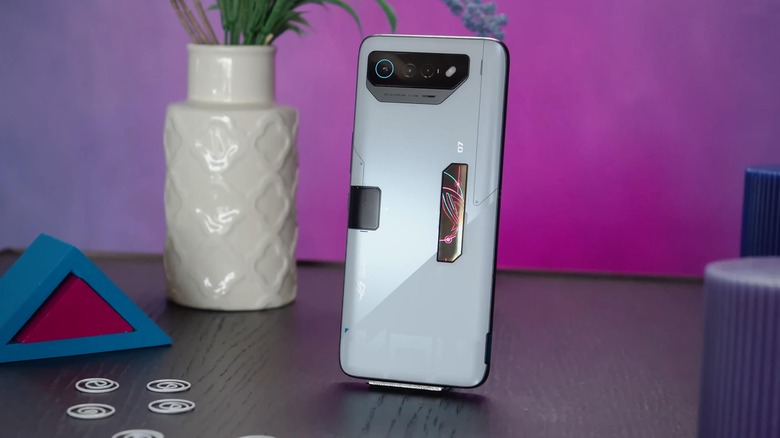Android Vs. iPhone: Which Is Best For Mobile Gaming?
Mobile gaming has been one of the most popular uses for smartphones, and that trend shows no signs of slowing. As mobile hardware and software become increasingly capable, the two main mobile ecosystems, Android and iPhone, have kept pace. Today, you can play a wide variety of games from the palm of your hand, from traditional mobile games to AAA titles. However, with both Apple and Google constantly boasting the gaming capabilities of their respective operating systems, which one really handles those gaming sessions the best?
Both iOS and Android have their strengths and weaknesses when it comes to gaming, and while we ultimately have to give the win to one of them, it's important to understand which platform best suits your particular needs. To that end, we'll need to explore what both platforms do well and where they respectively fall short. From game libraries and software limitations to enthusiast hardware, here are some of the key differences between gaming on iPhone and Android, along with our verdict on which is best overall.
iPhone has the App Store edge
When it comes to choosing a phone for mobile gaming, even the most high-powered device is worthless without a game library to play from, and that's one area where the iPhone shines. It's not as though the gap between available titles on iOS's App Store and Android's Play Store is oceanic, but it does exist. Since Apple releases only three to four iPhones a year on average, they're easier for developers to account for, as opposed to the hundreds of Android devices on the market.
In general, lots of popular apps — games included — tend to make their way to the iPhone first, eventually trickling down to Android once they've become popular enough to warrant the extra effort of porting or rewriting the app for a second OS. Yes, Android users eventually get most games in the long run, but it's a bit like being a PC gamer waiting around for the latest PlayStation exclusive to make its way to Steam. iOS also includes the subscription-based Apple Arcade, which contains a variety of exclusive games not available elsewhere.
That said, there are some games, including incredibly popular ones, that you won't find on the App Store.
Android can run apps from any source
What do you do if you want to play "Fortnite" on an iPhone? You connect to a cloud service, hope to high heavens you've got a good connection, and play it remotely. The popular battle royale maker Epic Games is on bad terms with Apple and refuses to offer the game through the App Store. Meanwhile, Android users can simply download "Fortnite" from the Epic Games website and start playing it locally.
Whether or not you play "Fortnite," it's an illustrative example of the freedom of movement Android offers. Being able to install any app you can find on the web without having to go through Google's official Play Store app library means that not only can you get games like "Fortnite," but you can install things like old-school Nintendo and PlayStation emulators to revisit classic games like "Super Mario Bros." or "Sonic the Hedgehog."
Is playing those copyrighted ROMs on your Android phone without a license to them strictly legal? To paraphrase Leonardo DiCaprio in "The Wolf of Wall Street," absolutely not, and this is not an endorsement of the practice, but an illustration of how much easier DIY gaming projects are on Android. While it's technically possible to do the same thing on an iPhone, you'll probably need to jailbreak the device first, which voids Apple's warranty.
iPhone is getting more AAA support
The scales of mobile gaming are tipping in Apple's favor lately, as the company announced ports of several AAA titles for the iPhone 15 Pro including celebrated titles like "Death Stranding" and "Resident Evil IV." Apple claims the iPhone's newfound ability to run these console-grade titles is due to improvements in the A17 Pro chipset powering it.
It's worth taking Apple's promises of AAA gaming in your pocket with a grain of salt. Many of the promised titles have yet to make their App Store debut, so for the time being, they're mostly vaporware. With that said, our review of the iPhone 15 Pro found it trouncing mobile titles like "Genshin Impact" without breaking a sweat.
If Apple follows through on its promises to bring more major titles to iOS, which it is likely to do, then the iPhone will become the pocket-sized console every gamer has wished for, giving it a staggering advantage over any Android device. If the iPhone becomes a real option for AAA gaming, it's hard to imagine any gamer choosing an Android instead.
Android has more device options
If your priority is gaming, the latest iPhone will certainly get the job done, but what about those gamer-specific features? For things like active cooling, gamepad-style triggers, and extra ports, you'll need to hop to Android's side of the fence. There, you'll find gaming phones like the ASUS ROG Phone 7 Ultimate, which has a 165 Hz AMOLED display, haptic triggers on the side of the phone, and even a physical fan accessory that clips onto the back for extra cooling while adding a headphone jack. You could also pick up the Redmagic 8S Pro, which boasts an internal high-speed fan, an edge-to-edge display, and a 6,000 mAh battery.
Of course, you may not be interested in first-person shooters, racing games, and all those other genres that stress your phone to its brink. Maybe you just want to play some "Candy Crush" or "Wordle." In that case, there are plenty of great Android midrange phones that will save you a lot of money compared to an iPhone while still being able to handle the games you enjoy.
On top of all that, you've still got options like the Samsung Galaxy S23 Ultra and other mainstream flagships, which, despite not being built for gaming, still have the flagship specs that games need to perform their best. An iPhone is certainly no slouch when it comes to gaming, but for those who want their phone to cater to their gaming, Android is where that niche gets filled.
Conclusion: iPhones are best for mobile gaming, but Android has niches
After considering all the major differences between Android and iOS when it comes to mobile gaming, it's clear that the two OSes are neck-and-neck, each having its own strengths and weaknesses. Overall, if you're choosing between the two solely on the basis of which is better for mobile gaming, an iPhone is probably the device most people will be satisfied with.
You'll have access to a robust library of popular games, with some of the best hardware on the market to enjoy them with. Moreover, Apple seems to have a newfound dedication to the mobile gaming space, perhaps sensing that the iPhone can be the pocket-sized console every gamer has dreamed of, and it's making a bold push into AAA gaming which, while not fully off the ground, will give the iPhone an even bigger upper hand over Android.
However, if you love DIY gaming, or if you really want specialized hardware for competitive gaming, you'll want to explore the world of Android. There's truly an Android phone to fit every niche, whether you want extra USB-C ports and crazy accessories, supercharged cooling solutions, or just an absurdly large battery for long play sessions. Android's ability to side-load apps makes it easy to find unique games, run emulators, and other outside-the-box gaming projects. Plus, if you're a "Fortnite" player, it's pretty much your only real option.
